|
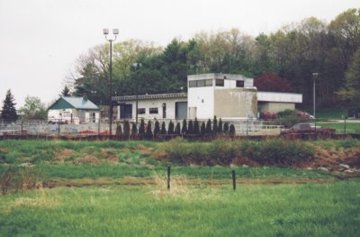 |
| Water from the Town of Durham’s wastewater treatment plant is discharged into the Oyster River, which feeds into Great Bay Estuary. |
As New Hampshire’s population climbs, wastewater and sewage are the talk
By Maureen Kelly
New Hampshire’s population is growing and the march of new residents into the Granite State shows no signs of slowing. By 2025, projections indicate that the state’s Seacoast region could see a 30 percent population increase. It is not too early, state officials have determined, to start planning for their arrival and for their sewage. In the coming years, 44 communities must decide how to manage their wastewater and septage. Those decisions may influence how the Seacoast develops and whether New Hampshire can protect its coastal resources in the face of a population boom.
|

To receive a free subscription to the
Gulf of Maine Times
click here
Or to receive the Times via e-mail contact us at:
timeseditor@
gulfofmaine.org
Phone:
(617) 492-5357
 Site Search
Site Search
|
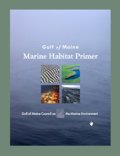
Download the beautifully illustrated
Gulf of Maine
Habitat Primer
For additional info about the
Gulf of Maine
including maps, photos, current research,
the NGO database, and to download other educational publications
please visit

The Gulf of Maine Council on the Marine Environment
|
|
Plans underway to restore tidal marsh
By Lee Bumsted
Mapmakers don’t often get the chance to redraw natural features on maps of well-known areas. But after the earthen embankment of Sherman Lake in Newcastle, Maine, gave way last October, they were given such an opportunity. The name "Sherman Lake" needs to be pulled from those maps too. "Upper Marsh River," anyone? What had been a body of fresh water for 71 years is returning to some semblance of what it once was, the upper end of the tidal Marsh River.
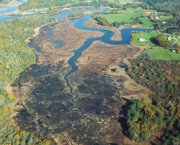 |
From lake to marsh. (Click on photo to enlarge).
NEWCASTLE, MAINE |
|
A
"doer" with a lengthy list of contributions, New Brunswick's
Sheila Washburn receives the Art Longard Award
By Lori Valigra
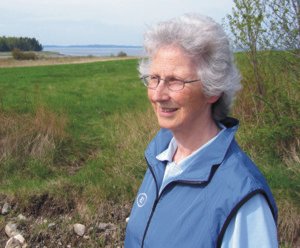 |
Shelia Washburn in St. Andrews, New Brunswick PHOTO: MICHAEL CAUGHEY |
Sheila Washburn describes herself as a doer, someone who can take on a project and get the necessary people involved to get things done. Add that to her love of the New Brunswick coast and Passamaquoddy Bay, and her husband being an environmentalist, and you get a strong advocate for the environment and for its preservation. Washburn, who recently received the Gulf of Maine Council’s Art Longard Award, is a consummate volunteer who has made substantial contributions to teaching people of all ages how to care for and safeguard the natural environment.
|
Features and Columns
Editor's Notes: Building a case for sound coastal management By
Andi Rierden
Gulf Voices: Tidal power - a green dream?
By Stephen Hawboldt
Visionary Awards
By Lori Valigra
Q & A with Don Hudson, Chewonki Foundation
By Lisa Capone
Growing cod in New Hampshire
By Maureen Kelly
"Rain gardens" in Massachusetts
By Maureen Kelly
Gulf Log:
Harnessing
power from Fundy tides; Moving turbines for the birds; Alewife loss linked
to cod disappearance; Better tracking of red tides
© 2006 The Gulf of Maine Times
This site is designed for optimum viewing with Internet Explorer, at a screen
resolution of 1024x768. |
Science Insights
Climate
changes everything...
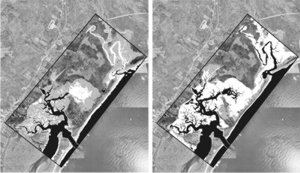 |
|
The
existing coastline at Wells, Maine, (left) and projected coastline
after a 3-foot rise in sea level.
IMAGES: MAINE
GEOLOGICAL SURVEY
|
The
scientific message is that climate change will totally transform marine
ecosystems in ways that today's management, conservation and policy
paradigms don’t necessarily accommodate, and the biggest changes
are yet to come.
What
do these changes mean for ecosystem-based management in the Gulf of
Maine?
|


